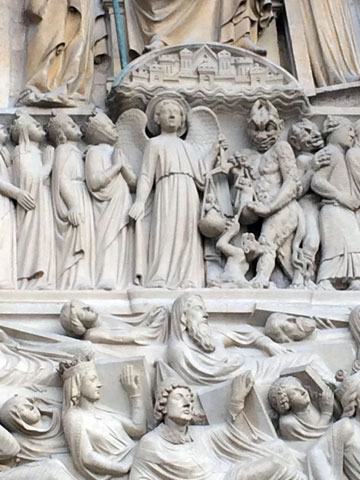Posted on July 22, 2019
Zen and Western Culture

St. Michael weighs souls at the Portal of Judgment, Notre Dame Cathedral.
Like oil and water, Zen and Western Culture don’t mix. Western spirituality is usually colored by Occidental mythology and the religious traditions of Judaism, Christianity and Islam. In exploring Eastern philosophies and religion, a person brought up in a Western culture, is disadvantaged. The practices and basic tenets of patriarchal monotheism are much different than those of the Eastern religions, and that can prove to be a stumbling block to those who attempt to take up the traditions of the East. Practices such as praying and penance, concepts such as heaven, hell and sin are not really part of the canon common to Zen and Taoism. People drawn to the East, at times, unconsciously, mix Western traditions into their understanding of Zen and the Tao.
Translation
Here the Chinese characters represent the term Western Culture. The characters do not translate to letters. It’s a different alphabet with a different way of visually representing language. Likewise, care must be taken to be mindfull of the mutually exclusive terms in both Zen and Western culture. Substituting Western words for Eastern concepts can sometimes alter the true meaning of that which is to be transmitted.
A quote attributed to Thich Nhat Hanh, posted on line, stated: “In the spirit of Buddhism, anything you do that is accompanied with mindfulness, concentration, and insight can be considered a prayer.” I’m sorry. I see mindfulness as observation. I see prayer as desire.
Merriam Webster’s definition of the word prayer: an address (such as a petition) to God or a god in word or thought.
O.E.D. definition: A solemn request to God, a god, or other object of worship; a supplication or thanksgiving addressed to God or a god.
You can argue that this definition wasn’t what was intended in the Thich Nhat Hanh quote but by definition this is what it means.
I’m sure the word prayer was used with good intentions but care needs to be taken when using Western terms to convey Eastern concepts. Instances such as this, sew confusion and send people (literally) down the wrong path. Both definitions use the word god. The Buddha was not a god. He was a man, enlightened to the oneness that is existence. In Eastern thought, to realize your true nature is to awaken to the underlying common thread of all existence, it has nothing to do with your soul seeking heaven.


 Follow
Follow